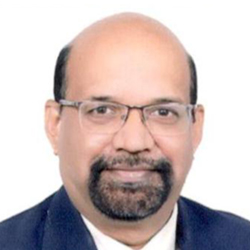Geo4Environment
The science of protecting and restoring our natural environment requires integrated, quantitative, and interdisciplinary approach that combines ecology, geology, meteorology, biology, chemistry, engineering, and physics knowledge of the Earth. The interdependency of the Earth’s ecosystems and the human impact on the environment is further adding to complex challenges faced by the government, businesses, scientists and environmentalists alike.
Geospatial technology can be used as a strategic tool to automate processes, gather and analyze new knowledge, and support decisions that make a profound difference on our environment. The technology is now becoming a core part of modern environmental practices used by geologists, climatologists, geographers, statisticians, archaeologists, oceanographers, and others. Geo4Environment track will tackle important and pressing environmental issues faced by the world today, and discuss the role of technology in solving the same.
Speakers

UNEP
Switzerland

Hexagon
Sweden

OECD
France

SpaceWill
China
.jpg)

INTERPOL
France

Institute for the Study of Crime and Law Enforcement (NSCR)
The Netherlands

C-SIGMA LLC
USA

Forest Crime Consultancy
The Netherlands

Noll Tufani Country Director
Build Change
Nepal

Geospatial Information Authority
Japan

GeoThings
Taiwan

Austrian Institute of Technology
Austria

Forest Survey of India
India

European Environment Agency
Denmark

GeoFort
The Netherlands

Swiss Federal Research Institute WSL
Switzerland

Geological Survey
Norway
SESSION THEMES
For decades now, numerous multilateral environmental agreements have been concluded; many meetings are held each year to advance implementation; and significant amounts of human resources are spent to produce national reports on the efforts undertaken. Yet, our planet’s ecosystem keeps declining and global warming doesn’t seem to be slowing down. In our globalized world of interconnected nations, economies and people, managing environmental threats, particularly those that cross political borders such as air pollution and biodiversity loss, will require new global, regional, national and local responses. Experts will share best practices on how geospatial technologies can contribute.
According to Global Financial Integrity’s 2017 report, 4 out of the 11 most financially-rewarding transnational criminal activities are linked to environmental crime. They include illegal logging, illegal mining, illegal fishing and illegal wildlife trade. These illicit environmental activities are currently estimated to be worth $258 billion annually and growing at an annual rate of about 5% to 7%.
High-tech invention and highly collaborative coordination is required in order to strengthen environmental security worldwide. Geospatial technologies such as Earth observation satellites, aerial drones, thermal imaging cameras, and GPS tags are essential monitoring tools across land and sea. The data collected can be shared via secure information networks that allow local, national, and international law enforcement teams to analyze, communicate, and generate leads against the environmental criminals.
The discussion will focus on the need for greater cross-boundary cooperation and collaboration on geospatial information for environmental security, including optimizing resources, evolving mechanisms for data sharing and geospatial technology transfer towards trans-boundary efficiencies.
In addition to loss of life, property damage, loss of livelihoods, and social and economic disruption; disasters may also cause significant environmental damage. For instance, the East Japan Great Earthquake and Tsunami in 2011 generated 24 million tons of solid waste, which is equivalent to approximately 100 years’ worth. Loss of ecosystems and fertile soil, contamination of water sources and damage to coastal mangroves can also leave the population vulnerable in the longer-term. It is critical that further environmental degradation is avoided in the reconstruction phase.
Mitigation of environmental impact must be considered as an integral part of the reconstruction design process. Geospatial technologies, including GIS, Earth observation, laser scanning, mobile mapping system, and others, can offer accurate and immediate post-disaster damage assessment that is essential in construction planning. Applying geospatial technology in recovery and reconstruction plan will be the key to enhance local environmental management practices and support informed decision-making.
Climate change is now recognized as one of the most dangerous menaces of the twenty-first century. Greenhouse gas emissions, rising sea levels, hole in the ozone layer, polar ice sheets melting, and increasing natural disasters are posing grave threats to sustainable development globally. Avoiding the highly dangerous climate change will require sustained efforts and profound changes in the world’s energy systems, land-use patterns, and socio-economic development trajectories.
Geospatial technology is absolutely essential to analyze and effectively plan for the adaptation to climate change. The climate community needs geospatial information in order to assess climate impacts, evaluate the risk that climate change is presenting, and more. The key is making geospatial data available, and most importantly accessible to the parties involved. How do we encourage industry players to contribute to a cause with less commercial value as climate adaptation? Stakeholders will deliberate.
TARGET AUDIENCE
- Climate & Meteorological Organizations
- Consultants
- Developmental Agencies
- Disaster Management Agencies
- Environment Agencies
- Forestry & Wildlife Conservation Agencies
- Funding Agencies
- Geoscience Organizations
- Geospatial Technology Companies
- Information Technology Companies
- Land & Natural Resources Organizations
- Multilateral Agencies
- National Geospatial Agencies
- National Statistical Agencies
- Non-governmental Organizations
- Oceanography & Coastal Zone Management Agencies
- Policy Makers
- Public & Private Geospatial Data Providers
- Research Institutions
- Water & Energy Organizations


